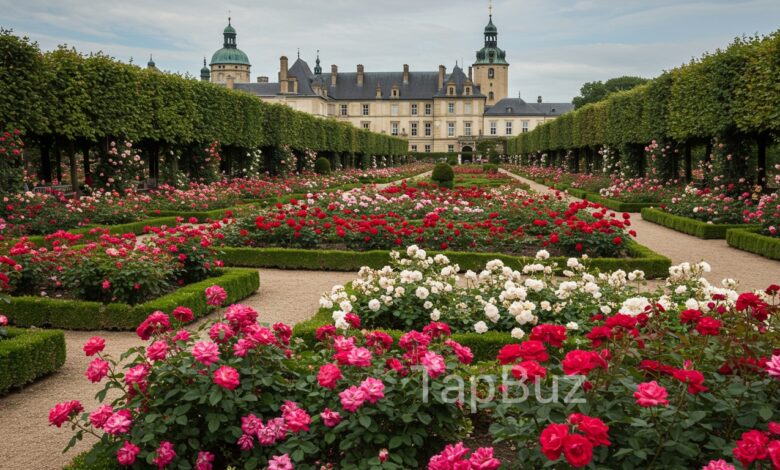The King’s Roses NWBKA: A Unique Blend of History, Nature, and Conservation

The King’s Roses NWBKA is an extraordinary initiative that beautifully intertwines England’s rich historical heritage with ecological conservation and community engagement. Spearheaded by the Northwest Beekeepers Association (NWBKA), this project celebrates the symbolic significance of roses in British history while promoting the crucial role of bees in our ecosystem.
By cultivating historically themed rose gardens and integrating sustainable beekeeping practices, The King’s Roses NWBKA fosters education, environmental awareness, and a deep appreciation for the interconnectedness of history, nature, and culture.
The Historical Significance: The War of the Roses
The initiative draws its inspiration from the War of the Roses, a series of civil conflicts fought in 15th-century England between two rival factions of the royal family:
- The House of Lancaster, symbolized by the red rose
- The House of York, represented by the white rose
These wars ultimately ended when Henry VII of the House of Lancaster defeated Richard III and united both houses through marriage, forming the Tudor dynasty. The unity was symbolized by the Tudor Rose, a combination of the red and white roses, representing peace and reconciliation.
By planting red, white, and Tudor roses, The King’s Roses NWBKA brings history to life while promoting a modern-day message of unity, sustainability, and conservation.
The Role of the Northwest Beekeepers Association (NWBKA)
The NWBKA plays a vital role in this initiative, leveraging its expertise in beekeeping to protect and promote pollinator health. Their goals include:
- Educating the public about the importance of bees in ecosystems.
- Supporting the health of pollinators through sustainable beekeeping.
- Integrating beekeeping with historical storytelling and environmental conservation.
Through this project, NWBKA underscores the essential interdependence between pollinators and plants, especially in heritage gardens like those featured in The King’s Roses.
Also Read: Kobe 8 TB Lace Swap: A Comprehensive Guide to Customizing Your Sneakers
Objectives of The King’s Roses NWBKA
The project is designed to fulfill three key objectives:
1. Historical Awareness
By using roses as a living symbol of the War of the Roses, this initiative educates people about an important chapter in English history. The project ensures that visitors learn about the conflict, resolution, and significance of the Tudor Rose in an interactive and engaging manner.
2. Environmental Sustainability
The King’s Roses gardens are designed with pollinator-friendly plants that support biodiversity. These gardens showcase:
- Sustainable gardening practices such as organic fertilization and reduced pesticide use.
- Native and pollinator-friendly plants that encourage a healthy ecosystem.
- Beehives to provide safe habitats for bees and other pollinators.
By focusing on these sustainable practices, the initiative contributes to bee conservation and ecosystem restoration.
3. Community Engagement
The project is not just about history and the environment—it’s also about people. Local communities are encouraged to take part in:
- Gardening and maintaining rose beds.
- Beekeeping workshops to learn about pollinators.
- Educational tours and events to connect with history and nature.
By involving local residents, The King’s Roses NWBKA fosters a sense of ownership, pride, and responsibility for environmental conservation.
Structure of The King’s Roses NWBKA Project
The project is carefully structured to maximize engagement, education, and conservation efforts.
1. Themed Rose Gardens
Each garden is designed with:
- Red, White, and Tudor Roses to symbolize the historical conflict and unity.
- Interpretive plaques explaining the War of the Roses and the importance of pollinators.
- Native wildflowers that complement the roses and attract pollinators.
2. Beekeeping and Pollinator Conservation
- Beehives are placed strategically within gardens to ensure pollination and maintain a healthy ecosystem.
- Beekeepers from NWBKA monitor and care for the bees, ensuring that they thrive in these environments.
3. Educational Programs and Public Engagement
- Workshops on beekeeping and pollinator-friendly gardening.
- Guided historical tours explaining the connection between roses and the War of the Roses.
- Community volunteer opportunities for hands-on participation in planting and maintaining gardens.
By combining heritage conservation, ecological awareness, and community involvement, this project has a lasting impact on education and sustainability.
Why Pollinators Matter: The Role of Bees in The King’s Roses NWBKA
Bees play a critical role in maintaining healthy ecosystems, and this project emphasizes their importance by integrating beekeeping into the gardens.
Threats to Bees and Pollinators
Unfortunately, bee populations are in decline due to:
- Habitat destruction from urbanization.
- Pesticide use, which poisons pollinators.
- Climate change, which disrupts seasonal patterns.
How The King’s Roses NWBKA Helps Protect Pollinators
- Creating safe, pesticide-free environments in the gardens.
- Educating the public about the threats to pollinators and how they can help.
- Encouraging sustainable gardening practices to protect bee habitats.
This initiative serves as a model for other conservation projects, showing how historical gardens can be both beautiful and ecologically beneficial.
Community Involvement: How People Can Participate
The King’s Roses NWBKA welcomes individuals, schools, and organizations to get involved in various ways:
1. Volunteering
Community members can help by:
- Planting and maintaining rose gardens.
- Assisting with beekeeping activities.
- Participating in clean-up and sustainability projects.
2. Attending Workshops and Events
- Learn beekeeping techniques from experts.
- Discover historical insights about the War of the Roses.
- Gain hands-on experience in eco-friendly gardening.
3. Supporting Local Pollinator Conservation
Individuals can contribute by:
- Planting pollinator-friendly flowers in their own gardens.
- Reducing pesticide use to protect bee populations.
- Educating others about the importance of bees and roses in English heritage.
By actively participating, community members help preserve both history and nature for future generations.
Future Plans and Expansion of The King’s Roses NWBKA
As the project grows, the NWBKA has ambitious plans to expand its reach and impact:
- Establishing more gardens across the region.
- Developing digital resources, such as virtual garden tours and educational videos.
- Collaborating with schools to integrate the project into history and science curriculums.
- Launching national awareness campaigns about pollinators and conservation.
These efforts aim to broaden the project’s influence and make historical-ecological education accessible to even more people.
Conclusion
The King’s Roses NWBKA is more than just a gardening or beekeeping project—it’s a symbol of unity, sustainability, and education.
By blending historical significance with ecological awareness, this initiative ensures that the legacy of the War of the Roses is preserved while also addressing modern environmental challenges.
Also Read: Inside the Luxurious Andre Hakkak House: A Testament to Modern Elegance
Through community involvement, educational outreach, and conservation efforts, The King’s Roses NWBKA serves as an inspiring model for how history, nature, and sustainability can thrive together.
Get Involved Today!
If you are passionate about history, gardening, or environmental conservation, consider joining The King’s Roses NWBKA to make a lasting impact on both heritage and nature!


